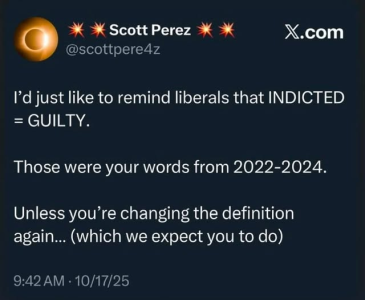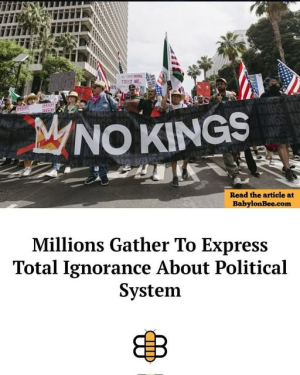-
In Memory of Rebarcock.
As we navigate life without Pat 'Rebarcock.' Flood, who passed on Sept 21, 2025, we continue to remember the profound impact he had on our community. His support was a cornerstone for our forum. We encourage you to visit the memorial thread to share your memories and condolences. In honor of Pat’s love for storytelling, please contribute to his ‘Rebarcock tells a story’ thread. Your stories will help keep his spirit alive among us.
You are using an out of date browser. It may not display this or other websites correctly.
You should upgrade or use an alternative browser.
You should upgrade or use an alternative browser.
Master Thread Dance Your Cares Away/Fraggle/Law Abiding Citizens
- Thread starter Bryan74b
- Start date
Master Threads.
FWIW
Maybe the money is drying up or the arrests of these protestors is having an effect.
Totally normal to see a dead body and do absolutely nothing about it.
Just like onlookers whipping out cell phones to video someone getting mugged or raped instead of helping the victim. You're on your own most of the time. Be vigilant.
Got a buddy’s daughter in army boot camp currently for about a week, states they’re all getting vaccinated tomorrow but isn’t sure about the clot shot
I told them the clot shot isn’t mandatory anymore and she can refuse to do so
Can anyone provide a link so I could send to them please Tia
I told them the clot shot isn’t mandatory anymore and she can refuse to do so
Can anyone provide a link so I could send to them please Tia
So he got pissed u didn't send him there 100% of the time?I made it where 50% of the time he clicked any link on the site it sent him to Grindr
GROK:Got a buddy’s daughter in army boot camp currently for about a week, states they’re all getting vaccinated tomorrow but isn’t sure about the clot shot
I told them the clot shot isn’t mandatory anymore and she can refuse to do so
Can anyone provide a link so I could send to them please Tia
No, the COVID-19 vaccine is no longer required for service in the U.S. military. The Department of Defense rescinded its vaccination mandate in January 2023, and this policy remains in effect as of October 2025.
war.gov +1
While it's strongly encouraged—especially for new recruits—to help protect service members and maintain readiness, refusal no longer leads to discharge or other penalties if an accommodation was requested.
tullylegal.com +1
In fact, the Pentagon has been actively reinstating thousands of service members who were previously discharged for refusing the vaccine, with expedited processes starting in early 2025 under Executive Order 14184 signed by President Trump.
cnn.com +2
This applies across all branches, including the Army, Navy, Air Force, Marines, Coast Guard, and Space Force. Policies can evolve, so check official DoD or branch-specific resources for the most up-to-date guidance.
Then I’m surprised he left…I made it where 50% of the time he clicked any link on the site it sent him to Grindr
Historical Context of Hamilton’s Views on Immigration
Alexander Hamilton, born in the Caribbean (Nevis) in 1755 or 1757 and arriving in the American colonies as a teenager in 1772, is often celebrated as an immigrant success story in Lin-Manuel Miranda’s musical Hamilton. Early in his career, Hamilton did advocate for policies that encouraged immigration. For instance, in his 1791 Report on Manufactures as Secretary of the Treasury, he proposed actively recruiting skilled workers, artists, and manufacturers from abroad to bolster the young nation’s industrial growth and population, viewing immigrants as economic assets who could “get the job done.” 2 5
However, Hamilton’s stance shifted dramatically in the late 1790s amid escalating political tensions. As a leading Federalist, he grew alarmed by the French Revolution’s radicalism, the Quasi-War with France (1798–1800), and fears that pro-French immigrants—particularly those aligned with Jefferson’s Democratic-Republicans—posed a security threat. He supported the Alien and Sedition Acts of 1798, which lengthened naturalization requirements from 5 to 14 years, authorized the deportation of “dangerous” non-citizens, and cracked down on critics of the government. Hamilton not only backed these measures but later complained they weren’t enforced stringently enough, even calling for the expulsion of foreign-born anti-Federalist editors he deemed hostile. 2 4 7
This evolution peaked in 1802, after Jefferson’s election, when Hamilton penned a series of essays titled The Examination. In Number VIII, he argued vehemently against unrestricted immigration, warning that it would import “the manners and maxims of Europe” and erode America’s republican character by flooding the country with unassimilated foreigners lacking a “temperate love of liberty.” He advocated for naturalization periods of 14 years or more to ensure loyalty, reflecting nativist concerns about cultural dilution and political subversion. 0 8 9
In essence, Hamilton’s opposition wasn’t blanket anti-immigration but targeted: he favored selective entry for “desirable” Europeans while fearing unchecked influxes from revolutionary France would undermine Federalist power and national stability. 3 6
The Musical’s Portrayal and the Rewrite
In Hamilton, the character is reimagined as a lifelong champion of immigrants, most iconically in the song “Yorktown (The World Turned Upside Down),” where he and Lafayette declare, “Immigrants: we get the job done!” This line, drawn loosely from his early pro-labor views, positions him as a symbol of the American Dream for newcomers—a direct counterpoint to contemporary debates on immigration and exclusion. 1 5
The writers, led by Miranda, deliberately omitted or reframed Hamilton’s later anti-immigration writings. Miranda has described the show as “a story about America then, told by America now,” using diverse casting and modern hip-hop to highlight themes of inclusion, ambition, and multiculturalism that resonate with 21st-century audiences. 6 This choice sidesteps the historical Hamilton’s “deeply nationalistic and elitist” turn toward nativism, as noted by historians like Phillip W. Magness, who argue it creates a “mythology” that glosses over his support for restrictive policies. 1 4
Why the Rewrite? Artistic and Thematic Intent
The primary reason for this rewrite appears to be thematic and political resonance. Miranda crafted Hamilton to celebrate the immigrant roots of the Founding Fathers (many of whom, like Hamilton, were born abroad in British territories) as a progressive narrative against modern xenophobia. 5 Including Hamilton’s full views would complicate the show’s core message of optimism and diversity—especially the idea that outsiders build nations—turning a feel-good anthem into a critique of hypocrisy. As Miranda noted in interviews, the musical prioritizes emotional truth over exhaustive biography, using Hamilton’s story to affirm that “many people who contribute to the prosperity of this nation aren’t born here.” 6
Critics like Magness contend this sanitizes history for ideological purposes, aligning with liberal immigration advocacy (e.g., the cast’s 2016 post-show address to Mike Pence on inclusion). 0 1 Yet, from a dramatic standpoint, the rewrite heightens the tragedy of Hamilton’s downfall and underscores the musical’s meta-commentary on who gets to tell America’s story: a diverse “America now” reclaiming its past for empowerment. 6
In short, the rewrite transforms a complex, contradictory figure into an unalloyed icon of inclusion, prioritizing inspirational storytelling over historical nuance to engage modern viewers on issues like belonging and opportunity.
Alexander Hamilton, born in the Caribbean (Nevis) in 1755 or 1757 and arriving in the American colonies as a teenager in 1772, is often celebrated as an immigrant success story in Lin-Manuel Miranda’s musical Hamilton. Early in his career, Hamilton did advocate for policies that encouraged immigration. For instance, in his 1791 Report on Manufactures as Secretary of the Treasury, he proposed actively recruiting skilled workers, artists, and manufacturers from abroad to bolster the young nation’s industrial growth and population, viewing immigrants as economic assets who could “get the job done.” 2 5
However, Hamilton’s stance shifted dramatically in the late 1790s amid escalating political tensions. As a leading Federalist, he grew alarmed by the French Revolution’s radicalism, the Quasi-War with France (1798–1800), and fears that pro-French immigrants—particularly those aligned with Jefferson’s Democratic-Republicans—posed a security threat. He supported the Alien and Sedition Acts of 1798, which lengthened naturalization requirements from 5 to 14 years, authorized the deportation of “dangerous” non-citizens, and cracked down on critics of the government. Hamilton not only backed these measures but later complained they weren’t enforced stringently enough, even calling for the expulsion of foreign-born anti-Federalist editors he deemed hostile. 2 4 7
This evolution peaked in 1802, after Jefferson’s election, when Hamilton penned a series of essays titled The Examination. In Number VIII, he argued vehemently against unrestricted immigration, warning that it would import “the manners and maxims of Europe” and erode America’s republican character by flooding the country with unassimilated foreigners lacking a “temperate love of liberty.” He advocated for naturalization periods of 14 years or more to ensure loyalty, reflecting nativist concerns about cultural dilution and political subversion. 0 8 9
In essence, Hamilton’s opposition wasn’t blanket anti-immigration but targeted: he favored selective entry for “desirable” Europeans while fearing unchecked influxes from revolutionary France would undermine Federalist power and national stability. 3 6
The Musical’s Portrayal and the Rewrite
In Hamilton, the character is reimagined as a lifelong champion of immigrants, most iconically in the song “Yorktown (The World Turned Upside Down),” where he and Lafayette declare, “Immigrants: we get the job done!” This line, drawn loosely from his early pro-labor views, positions him as a symbol of the American Dream for newcomers—a direct counterpoint to contemporary debates on immigration and exclusion. 1 5
The writers, led by Miranda, deliberately omitted or reframed Hamilton’s later anti-immigration writings. Miranda has described the show as “a story about America then, told by America now,” using diverse casting and modern hip-hop to highlight themes of inclusion, ambition, and multiculturalism that resonate with 21st-century audiences. 6 This choice sidesteps the historical Hamilton’s “deeply nationalistic and elitist” turn toward nativism, as noted by historians like Phillip W. Magness, who argue it creates a “mythology” that glosses over his support for restrictive policies. 1 4
Why the Rewrite? Artistic and Thematic Intent
The primary reason for this rewrite appears to be thematic and political resonance. Miranda crafted Hamilton to celebrate the immigrant roots of the Founding Fathers (many of whom, like Hamilton, were born abroad in British territories) as a progressive narrative against modern xenophobia. 5 Including Hamilton’s full views would complicate the show’s core message of optimism and diversity—especially the idea that outsiders build nations—turning a feel-good anthem into a critique of hypocrisy. As Miranda noted in interviews, the musical prioritizes emotional truth over exhaustive biography, using Hamilton’s story to affirm that “many people who contribute to the prosperity of this nation aren’t born here.” 6
Critics like Magness contend this sanitizes history for ideological purposes, aligning with liberal immigration advocacy (e.g., the cast’s 2016 post-show address to Mike Pence on inclusion). 0 1 Yet, from a dramatic standpoint, the rewrite heightens the tragedy of Hamilton’s downfall and underscores the musical’s meta-commentary on who gets to tell America’s story: a diverse “America now” reclaiming its past for empowerment. 6
In short, the rewrite transforms a complex, contradictory figure into an unalloyed icon of inclusion, prioritizing inspirational storytelling over historical nuance to engage modern viewers on issues like belonging and opportunity.
It doesn’t sound like he yelled “Traitor”. It sounded like people that annoy you.
Im supposing those windows face mecca.
Similar threads
- Replies
- 13
- Views
- 607
- Replies
- 6
- Views
- 343
- Replies
- 0
- Views
- 2K
- Replies
- 56
- Views
- 5K


























